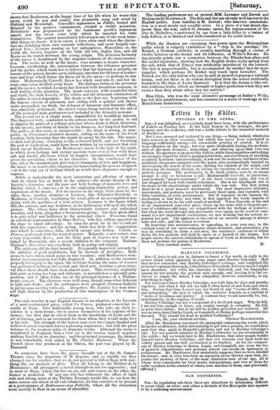rattro to tip ehitur.
ENCORES AT THE OPERA.
Sin—I was delighted, as everybody must have been, with the performance of Fidelio on Tuesday last. It did high honour to the manager, the per- formers, and the orchestra, and was a noble tribute to the immortal memory of Beethoven.
But I was annoyed and irritated by one thing—a- thing, indeed, which Ion have noticed on other occasions, but which has never been reprobated in language sufficiently strong—the abominable practice of encores. It is al- ways offensive on the stage,. but was quite intolerable during the perform- ance of the most dramatic, interesting, and affecting opera that ever was written. No spectator of an opera like fideho, while his sympathies and feelings are strongly roused by what is passing before him, can ever dream of anything so utterly heartless : and accordingly, it was not the audience, but knots of im- pertinent clacqueurs scattered over the house, who pertinaciously insisted on interrupting the march of the scene, chilling the warmth of the action, and destroying all dramatic illusion, by calling for repetition of some of the most pathetic passages. The performers, to do them justice; were by no means prompt to obey so barbarous a call: Mademoiselle Cruvelli, in particular, used as much "passive resistance" as she durst venture upon, and was at last dragged forward with visible reluctance. She is too intelligent not to be aware of the disadvantage under which she was laid. The best acting must be M a great measure mechanical. The most impressive attitudes, movements, and gestures, must be previously fixed upon, and repeated, with little variation, at every performance. But if repeated on the instant, the mechanism is laid bare, and what at first appeared the warm impulse of feeling is shown to be the cold result of method. When Cruvelli, at the end of an impassioned concerted piece, threw up her arms with a buoyant ges- ture of confidence said hope' we sympathized with the feelings of Leonora; but when she went through this movement over again, at the word of com- mand of a few impertinent vociferators, we saw nothing but the actress re- peating her part. The applause at the end of an encored passage is always faint and cold ; and the reason is evident.
By inserting this remonstrance, or appealing, in your own way, to the common sense of our opera-managers, music-directors, and performers, you may do something to abate a nuLance, the continued existence of which shows the low position still held by opera as a branch of the drama. Let. people encore the concert-exhibitions in operas of Verdi or Donizetti, but let them not profane the genius of Beethoven.


























 Previous page
Previous page